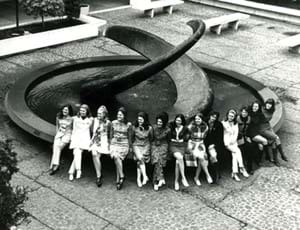Photograph - Royal Melbourne Show Prize Winning Bull, 1973
Background
The photographer, Francis Casimir Farnell Johnson (b. 18/12/1908 -d. 15/7/1997), the first of twelve children to parents Graham Rhind Johnson and Constance Mary Rowe, was born into a family with deep and abiding connections to agriculture and the media.
His photography journey began when he submitted photos of life on the station to various journals such as ‘The Bulletin’ during the 1930s. Frank married Emily Beatty prior to the outbreak of World War II, and contributed to the war effort through his work at the Commonwealth Aircraft Corporation at Fisherman’s bend. All the while, he continued to photograph important figures visiting the factory and significant events and joined the Melbourne Camera Club.
After the war, Frank continued to photograph local shows and community, sheep and cattle sales and various local activities with these photos often being displayed in the local paper, the Dairyfarmer, The Pastoral Review, and Stock and Land.
Frank was instrumental in capturing decades of events at the Royal Melbourne Show (RMS) including the Grand Parade, judging, and awards ceremonies. In recognition for his achievements in documenting Australian agricultural pursuits, Frank was given an award from the Rural Press, and invited to present an award for the champion Corriedale at the RMS.
Significance
This item is a part of a larger collection of 4,500 Frank Johnson photographs and negatives donated to Melbourne Royal by Frank Johnson’s daughter, Francis Beatty Wallace in 2016. This collection spanning from the 1930s to the 1980s holds important social and historical significance in preserving and sharing Victoria’s agricultural history and community. The photographs capture the local, regional, and state’s shared relationships developed through agriculture and the importance of farming and husbandry to the population and development of Australia.
A large proportion of these photographs depict events from the Royal Melbourne Show, including livestock competitions, exhibitions and awards ceremonies. Dating back to 1848 when the society first began, the Royal Melbourne Show has held a special place in the hearts and minds of Victorians, allowing for extensive showcasing and celebration of agricultural excellence, bridging the divide between metropolitan and rural Victoria.











